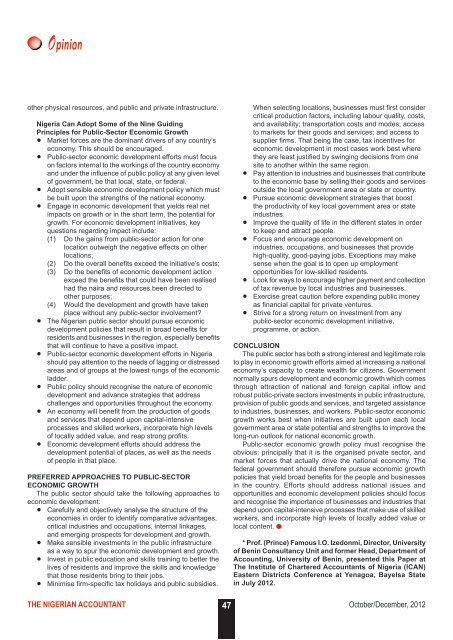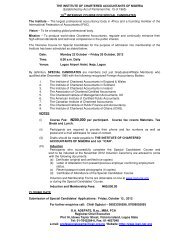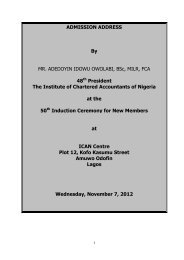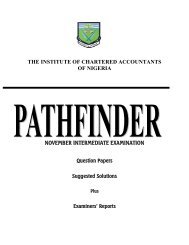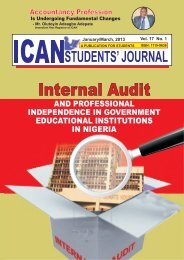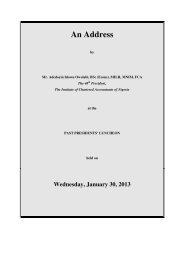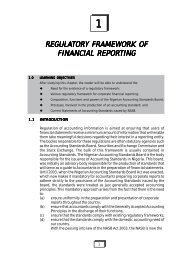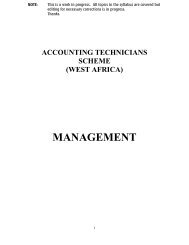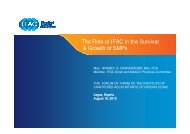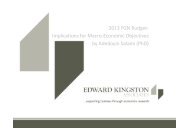The Nigerian Accountant 2012 October/December Edition
The Nigerian Accountant 2012 October/December Edition
The Nigerian Accountant 2012 October/December Edition
You also want an ePaper? Increase the reach of your titles
YUMPU automatically turns print PDFs into web optimized ePapers that Google loves.
Opinionother physical resources, and public and private infrastructure.Nigeria Can Adopt Some of the Nine GuidingPrinciples for Public-Sector Economic Growth• Market forces are the dominant drivers of any country’seconomy. This should be encouraged.• Public-sector economic development efforts must focuson factors internal to the workings of the country economyand under the influence of public policy at any given levelof government, be that local, state, or federal.• Adopt sensible economic development policy which mustbe built upon the strengths of the national economy.• Engage in economic development that yields real netimpacts on growth or in the short term, the potential forgrowth. For economic development initiatives, keyquestions regarding impact include:(1) Do the gains from public-sector action for onelocation outweigh the negative effects on otherlocations;(2) Do the overall benefits exceed the initiative’s costs;(3) Do the benefits of economic development actionexceed the benefits that could have been realisedhad the naira and resources been directed toother purposes;(4) Would the development and growth have takenplace without any public-sector involvement?• <strong>The</strong> <strong>Nigerian</strong> public sector should pursue economicdevelopment policies that result in broad benefits forresidents and businesses in the region, especially benefitsthat will continue to have a positive impact.• Public-sector economic development efforts in Nigeriashould pay attention to the needs of lagging or distressedareas and of groups at the lowest rungs of the economicladder.• Public policy should recognise the nature of economicdevelopment and advance strategies that addresschallenges and opportunities throughout the economy.• An economy will benefit from the production of goodsand services that depend upon capital-intensiveprocesses and skilled workers, incorporate high levelsof locally added value, and reap strong profits.• Economic development efforts should address thedevelopment potential of places, as well as the needsof people in that place.PREFERRED APPROACHES TO PUBLIC-SECTORECONOMIC GROWTH<strong>The</strong> public sector should take the following approaches toeconomic development:• Carefully and objectively analyse the structure of theeconomies in order to identify comparative advantages,critical industries and occupations, internal linkages,and emerging prospects for development and growth.• Make sensible investments in the public infrastructureas a way to spur the economic development and growth.•Invest in public education and skills training to better thelives of residents and improve the skills and knowledgethat those residents bring to their jobs.When• Minimise firm-specific tax holidays and public subsidies.selecting locations, businesses must first considercritical production factors, including labour quality, costs,and availability; transportation costs and modes; accessto markets for their goods and services; and access tosupplier firms. That being the case, tax incentives foreconomic development in most cases work best wherethey are least justified by swinging decisions from onesite to another within the same region.• Pay attention to industries and businesses that contributeto the economic base by selling their goods and servicesoutside the local government area or state or country.•Pursue economic development strategies that boostthe productivity of key local government area or stateindustries.• Improve the quality of life in the different states in orderto keep and attract people.•Focus and encourage economic development onindustries, occupations, and businesses that providehigh-quality, good-paying jobs. Exceptions may makesense when the goal is to open up employmentopportunities for low-skilled residents.• Look for ways to encourage higher payment and collectionof tax revenue by local industries and businesses.• Exercise great caution before expending public moneyas financial capital for private ventures.•Strive for a strong return on investment from anypublic-sector economic development initiative,programme, or action.CONCLUSION<strong>The</strong> public sector has both a strong interest and legitimate roleto play in economic growth efforts aimed at increasing a nationaleconomy’s capacity to create wealth for citizens. Governmentnormally spurs development and economic growth which comesthrough attraction of national and foreign capital inflow androbust public-private sectors investments in public infrastructure,provision of public goods and services, and targeted assistanceto industries, businesses, and workers. Public-sector economicgrowth works best when initiatives are built upon each localgovernment area or state potential and strengths to improve thelong-run outlook for national economic growth.Public-sector economic growth policy must recognise theobvious: principally that it is the organised private sector, andmarket forces that actually drive the national economy. <strong>The</strong>federal government should therefore pursue economic growthpolicies that yield broad benefits for the people and businessesin the country. Efforts should address national issues andopportunities and economic development policies should focusand recognise the importance of businesses and industries thatdepend upon capital-intensive processes that make use of skilledworkers, and incorporate high levels of locally added value orlocal content.* Prof. (Prince) Famous I.O. Izedonmi, Director, Universityof Benin Consultancy Unit and former Head, Department ofAccounting, University of Benin, presented this Paper at<strong>The</strong> Institute of Chartered <strong>Accountant</strong>s of Nigeria (ICAN)Eastern Districts Conference at Yenagoa, Bayelsa Statein July <strong>2012</strong>.THE NIGERIAN ACCOUNTANT 47<strong>October</strong>/<strong>December</strong>, <strong>2012</strong>


